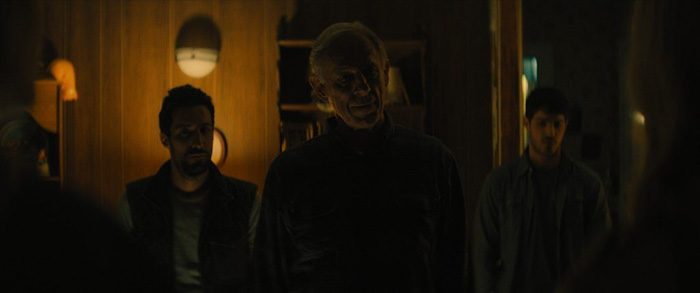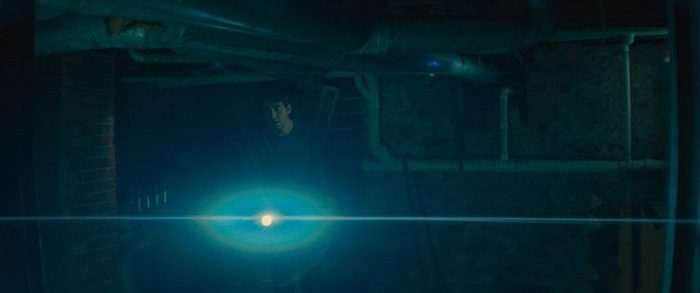It’s practically impossible to talk about what’s happening in Chris Sparling‘s latest thriller, Mercy, without spoiling it. The writer-director knows, and splits his film into three pieces as a result: the first third completely shrouded in mystery, the next a replay from alternative perspectives, and the last the truth of the pursuers’ identities and the lies their victims have been spinning from the start. The only other Sparling film I’ve seen is his most popular one, Buried, which he wrote with Rodrigo Cortés directing, but the similarities in deflection and confusion are obvious. Whereas it focused solely on one character trapped without the ability to fully comprehend what’s happening, Mercy places its viewer in the coffin. We don’t know who’s out there and we definitely cannot trust the family in peril.
I’ll stick solely to the first act to whet your suspense-thriller appetite with a brief summary of matriarch Grace’s (Constance Barron) failing health opposite her second husband, George (Dan Ziskie), and four sons. The eldest boys (James Wolk‘s Brad and Tom Lipinski‘s Travis) were from her previous marriage, their father described as an abusive yet wealthy figure who died long ago. The other two (Michael Godere‘s Ronnie and Michael Donovan‘s TJ) have been conspiring with their dad to ensure that the wealth will ultimately be theirs alone. George changed the will, moving Grace’s estate to himself with Ronnie and TJ’s acquisition occurring after his passing. Oblivious to this deceit, Brad and Travis believe their birthright splits five ways. And everyone ignores Dr. Turner (Dion Graham) as a result.
Turner offers solace with an experimental drug able to remove Grace’s pain. Why do they refuse it if she’ll still die? We don’t know — this wrinkle providing the bulk of the film’s intrigue. We know why they want her dead despite varying degrees of love with Ronnie and TJ in default, Travis’ ex-con in debt, and Brad seeking a payday with girlfriend Melissa (Caitlin FitzGerald), but not the reason pain and suffering must remain. So when Brad and Travis wake in the middle of the night to find George, Ronnie, and Travis gone and Dr. Turner’s bag (anyone can administer the medication) on Grace’s bedroom table, we’re even more confused. The lights go out, two masked men wreak havoc, and someone gets a bullet to the head.
I was wholly invested during this first act because I had absolutely no clue what was going on. It was borderline frustrating to the point of leaving partway through — that’s how clueless we are upon being dropped into this disturbed family’s home. Everyone’s shady and seemingly capable of homicide beyond just letting Grace die. Could the masked men be Ronnie and TJ? You bet. Could Travis or Brad be in one it, playing the fool for each other and us? It wouldn’t be the first time a movie went in that direction. What kept me in my seat was, therefore, a desire to find out. I needed to know what Dr. Turner’s bag contained because I started feeling shades of Richard Kelly’s The Box — a supernatural force potentially at-hand.

So I inched forward in my seat when the second act rewound the action and showed us what happened before Brad and Travis woke up. We’re supplied a substantial amount of clarity, yet no one should be surprised to find themselves more confused than before; the more we discover about these characters we’ve seen, the less we know about those we didn’t. But herein exists Mercy‘s conundrum: to deliver something our genre-steeped minds can assume or something we can’t even begin to fathom. I generally go for the latter, but it only works if the presence of an unknown adds something to the proceedings that force someone onscreen (or the audience) to think differently. Sadly, Sparling never quite molds his resolution into doing so.
Where he takes us makes contextual sense to the big picture, and the climax never wavers from its bleak anything-goes morality. But to what end? It shocks us and places whoever is still alive to acknowledge its reveal firmly into a corner, but is that enough to succeed? For some. For me, however, it felt lacking. Too much is suddenly taken at face value to render all mysterious intrigue a waste of time. My imagination was piqued, my mind hatching up crazy outcomes alongside the anticipation that Sparling would deliver something else entirely. But what we actually get is something of a whimper — a bit pedestrian, with a motivation less complex where it concerns Grace and more convenient where it concerns the suspense.

If this were a straightforward horror of faceless monsters terrorizing this family without each pair of brothers knowing whether the other was alive or involved, it may have worked in a randomized violence. Because the villains are unmasked, though, one clamors to know more — to know their history as much as we do their unsuspecting victims, and to know what sparked them into action besides warped religious notions of duty. Showing them demands questions that the film isn’t interested in answering. But the absence of this meaning doesn’t ignite conversation and interpretation; it leaves a gaping hole that can only be filled with irritation. And that’s a shame, because the first two acts really do work.
Sparling is as crafty visually as he is with dialogue throughout that opening hour of uncertainty, stringing us along without the ability to grasp a full picture, even after merging two different vantage points into one. Both Wolk and Lipinski invest in the mystery, their characters lying to themselves as much as the audience to keep the lights out until the last possible moment. I just wish it added up to more than hollow thrills. While the ending doesn’t discount the dread or atmosphere from the start, it asks more questions than it answers. And since those queries aren’t necessary for the trajectory laid out from start to finish, Sparling thinks one shouldn’t care. But I do. We learn enough about what’s happening; not enough about why.
Mercy played at the Buffalo International Film Festival and will debut on Netflix.


